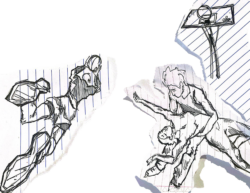Sitting in the last possible row in the lower section at chilly Camden Yards last Saturday night for Cal Ripken Jr.’s final game of his career, I realized that I never thought of him as a great player.
There was never a time during his career when I thought that he was deserving of the praise that sportswriters continually heaped upon him. Sure he played a lot of games in a row, which is a strong testament to his dedication to the game, his resiliency and also his luck.
Still, Cal only hit more than 30 home runs once in his career, and he only hit over .300 or had over 100 RBIs four times. Colorado Rockies right fielder Larry Walker, for example, doesn’t receive anywhere near as much praise as Cal even though Walker has already had double the number of .300 seasons in about half as long of a career. My reluctance to recognize Cal’s greatness continued after Cal’s last at-bat, a fly-out in the eighth inning, and even after Brady Anderson struck out on a 3-2 count to end the game with Cal on deck. I didn’t fully begin to appreciate Cal Ripken until he began to take his victory lap around the perimeter of the field.
As he went around, I saw a grown man wearing a vintage Oriole batting helmet crane his neck and lift up his similarly helmeted son so that both could get a final look at their idol. I saw people on the tips of their toes covered in Orioles gear clapping furiously with tears in their eyes. To all these people, Cal was obviously more than a baseball player.
At that moment, I understood why so many felt this way for a simple, only above-average athlete who happened to play 20 years of baseball. For these people and for myself as well, the thought of Cal Ripken Jr. was analogous to the thought of baseball. For my entire life I knew that if I ever saw any Orioles game, Cal Ripken Jr. would be there at shortstop or at third base, he would go one for four, and he would play flawlessly in the field. The knowledge that Cal Ripken Jr. was going to play every day comforted those who watched him.
He was dependable; he was reliable; he was constant.
Brady Anderson best described how this loss of stability has affected people.
“You see a lot of people crying in every town where he plays his last game, not just here in Baltimore. There are a lot of sad people here tonight. They’re not sad for Cal. They’re sad for themselves because they won’t get to see him play anymore,” he said in a Washington Post article published the following day. People did not simply love Cal for the way played the game; they loved him because he played the game almost every day for 20 years.
When Cal was finished circling the field, I prepared myself for his speech in which I hoped he would address how he wished people to view him and his career. Cal did not disappoint, although he did understate himself. Cal said, “One question I’ve been repeatedly asked these past few weeks is, “How do I want to be remembered? My answer is simple. To be remembered at all is pretty special.”
Cal Ripken Jr.’s name will not only be remembered, but it will also be interwoven with the word “baseball” in my mind and in the minds of many others.




